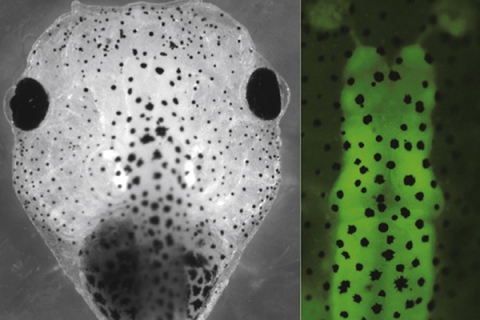This submission comprised staff from the Schools of Biological Sciences, Pharmacy and Biomedical Sciences, Health and Care Professions, and the Dental Academy. Our Unit’s research is characterised by its multilevel approach to addressing important biological and medical questions, from lab bench to patient bedside.
Over the REF period, we expanded into new research areas including bioinformatics, developmental diseases, care professions and orthopaedic medicine. We also enhanced the scope of our interdisciplinary research to address global issues, for example, using protein engineering approaches to address environmental polluting plastics.
The vitality of the Unit is underscored by the 68% increase in the number of staff members returned, 17% of whom were new early career researcher appointments, a 60% increase in external funding secured and a 38% increase in PhD completions, compared with the previous REF period.
Results in REF 2021
- 90% of our overall research quality was rated as world-leading or internationally excellent in terms of originality, significance and rigour.
- 87.2% of our research outputs were rated as world-leading or internationally excellent in terms of originality, significance and rigour.
- 100% of our impact case studies were rated as very considerable in terms of their reach and significance.
- 87.5% of our research environment was rated as conducive to producing research of world-leading or internationally excellent quality and enabling outstanding or very considerable impact, in terms of its vitality and sustainability.
Research areas
Our research is enabled through four research groups:
Molecular Biophysics focuses on the study of biological processes in terms of the structure and function of biomolecules and their interactions. Notable achievements include the structure determination of lignin- and plastic-degrading enzymes, the structural and molecular regulatory mechanisms of ribonucleases relevant to bacterial resistance and screening technology to develop novel antibacterial compounds
Genetic Basis of Disease investigates the roles of genes in early development and the onset or progression of diseases. Their research has included the identification of mitochondrial genetic mutations in cancers, a gene variant contributing to neurodevelopmental disorders and the development of gene-editing technology to investigate rare genetic diseases.
Biomaterials and Drug Delivery focuses on the design, synthesis and medical applications of biomaterials, biosensors, drugs and drug delivery systems. The group has developed nano-carriers for targeted delivery of biopharmaceuticals, hydrogels for drug delivery and tissue engineering, and implants for orthopaedic medicine.
Ageing and Lifelong Health investigates the health and disease of various organ systems, and the development of therapies or management programmes for associated medical conditions. Our research has identified molecular mechanisms underpinning brain disorders, developed novel endoscopic methods for early detection of intestinal cancers, underpinned a new community treatment programme for patients suffering from chronic respiratory diseases, and identified molecular urine markers to enhance the diagnosis of bladder disorders in the aged.
Impact case studies
The impacts of our research ranged from enhancing biomedical research capacity and transforming research ethics to improving patient care.

Earlier detection of oesophageal cancer saves lives
A team from the University and Portsmouth Hospitals University NHS Trust developed a method to improve the detection of precancer and cancer that significantly reduces the likelihood of cancer development. Now recommended by professional bodies and in use worldwide, early identification reduces the mortality from the associated surgery, is applicable to previously untreatable patients, and saves costs in comparison with previous methods.

Improved patient health and reduced burden on NHS services through new interventions for chronic respiratory conditions
A series of community-based programmes delivered a new model for the assessment and care of patients with chronic respiratory disease. A multidisciplinary team provided early identification of patients at risk from poorly-controlled diseases and upskilled patients and primary care providers to improve self-management, keeping patients better and more independent. This reduced respiratory crises, unscheduled hospital admissions, medication needs and associated costs to the NHS, and improved patient quality of life. This approach is now recommended by NICE and applied to other long-term health conditions including diabetes and dementia.

The European Xenopus resource centre (EXRC): supporting the 3Rs, enhancing the efficiency of biomedical research and improving the diagnosis of rare genetic diseases
Our EXRC provided quality-assured frog lines, reagents and services to over 180 laboratories worldwide and is a lead for the Xenopus community. It has developed methods and approaches to reduce and refine the use of frogs in experimentation and drive the incorporation of ‘3Rs’ (Replacement, Reduction and Refinement) in animal research into policy and practice. EXRC research and activities have improved the efficiency and effectiveness of the global Xenopus research base, enhanced the capability and competitiveness of international companies supporting European chemical regulation, and enabled new research addressing rare genetic disorders.

Transforming health research governance and ethics in the UK National Health Service and Ministry of Defence
Our research was the basis for the Health Research Authority’s ‘Make it Public’ transparency strategy and underpinned a major revision of the MOD Joint Service Publication governing defence human participant research. This has led to measurable improvements in the transparency of research and efficiency of the research approvals process, specifically cutting average review times by one third within the MOD. It has also enabled the MOD to comply with clinical trial regulations, directly impacting researchers and research participants across a wide range of medical and military-related topics, and covering many million pounds worth of research investment.
Collaborations and partnerships
More than 77% of our publications in this assessment period were with international or national co-authors. Staff in our Unit collaborated with researchers in more than 50 countries in Asia, Europe and the Americas.
Infrastructure
We invested more than £5 million towards the Institute of Biomedical and Biomolecular Sciences' world-class research facilities to further develop strategically important areas such as enzyme innovation, bioresources, advanced microscopy and bioinformatics.
